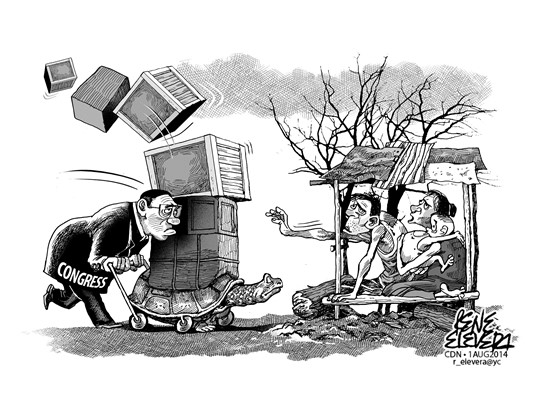Not a few people’s eyebrows were raised when President Aquino in his 5th State of the Nation Address (Sona) reported about the “quick” response of government to the triple whammy of 2013.
He said that those displaced by urban warfare in Zamboanga City by the attack of Nur Misuari’s men in September last year will start returning to their rebuilt houses. But construction just started and would take months more to finish.
President Aquino also said that compared to major calamities like the tsunami that swept the Indian Ocean in 2004, government’s response to supertyphoon Yolanda/ Haiyan was quicker. He also cited Aceh, Indonesia where a tsumani struck in December 2004.
That is the problem with comparisons. You either come out looking better or worse.
Manila’s response to Yolanda fared better than Jakarta’s. But if you compare it with Bangkok’s response to the same tsunami in Phuket Island or to Tokyo’s response to the tsunami that swept northern Japan in 2011, PNoy’s sterling self-assessment of Yolanda would pale in comparison.
The government keeps assuring the people that money is available for rehabilitation. Of late, Malacañang reported that P90 billion or more than half of the P160-billion Yolanda rehabilitation fund was already released to implementing agencies.
But if you go to the areas leveled by Yolanda, the actual rehabilitation effort of government is not halfway done.
Things need to speed up.
We do not lack a policy framework. The Disaster Risk Reduction and Management (DRMM) Act of 2010 and its implementing rules clearly state how government should prepare for disasters and respond when one strikes.
What we lack are people in a position of influence and accountability to execute these instructions.
The halls of Philippine Congress fell silent then broke out in prolonged applause when President Aquino thanked the international community for the massive global humanitarian movement in the aftermath of Yolanda.
Now, with Malacanang’s penchant to recite amounts of money available for rehabilitation and disaster response, it is high time that it walks the talk.
Like the DRRM Act, the almost two-year old People’s Survival Fund (PSF) law or RA 10174 that creates a trust fund for local government units and other grassroots institutions to avail for disaster mitigation and climate change adaptation projects is proactive.
RA 10174 will be two years old in two weeks and is still unfunded.
If reports are true, the PSF will finally be funded in the 2015 budget.
Hopefully, the initial P1-billion allocation under the national DRRM fund will not be watered down by Congress, which may view it as a piglet in the budget.
